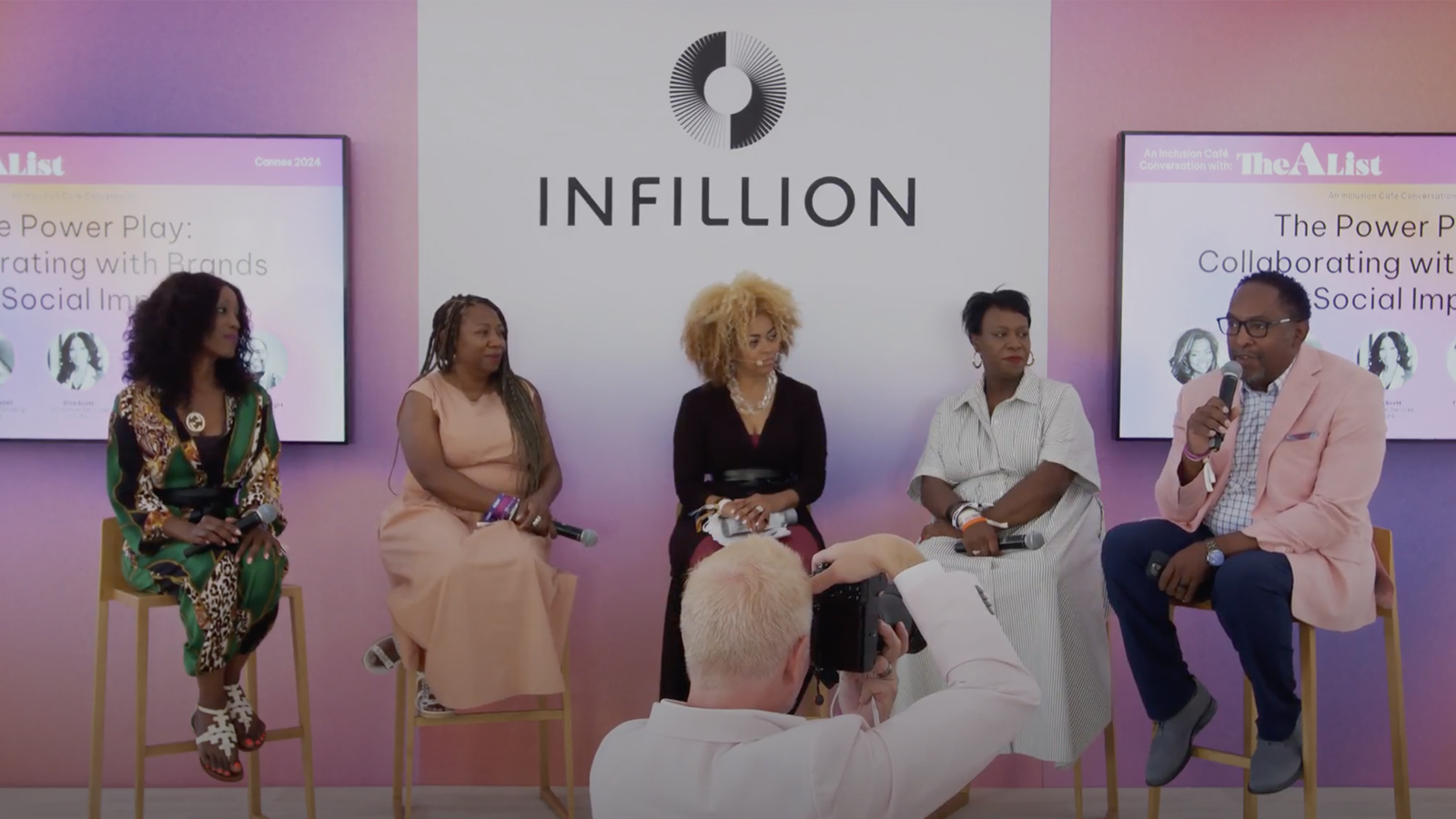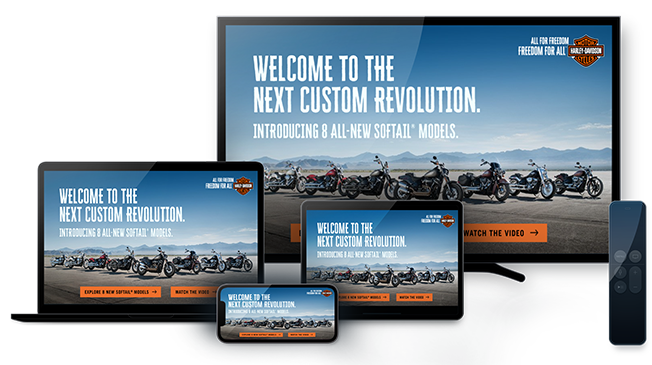The Power Play: Collaborating with Brands for Social Impact

Thanks to social media, we live in an age of unprecedented exposure to the lives and voices of professional athletes. While soccer legends Lionel Messi and Cristiano Ronaldo have over 500 million followers each, perhaps the bigger impact of social media has been that platforms like Instagram and TikTok have made it possible for athletes on the cusp of fame to build an audience and share their stories and passions.
This, of course, makes brands interested. So what’s the playbook for brands when those athletes are motivated – as athletes often are – to use their voices for social change? An illuminating discussion at Cannes Lions 2024 tackled this topic head-on.
“The Power Play: Collaborating with Brands for Social Impact,” an Inclusion Café Conversation sponsored by Infillion in partnership with TheAList, hosted four leading sports and brand executives steering a movement to leverage athletes’ power of persuasion for meaningful social impact. This lineup of leaders was Elizabeth Campbell, VP Field & Culture Marketing of McDonald’s; Gina Scott, VP Partner Services of the NFL Players Association (NFLPA); Tracy Sturdivant, President of The League; and Navarrow Wright, COO/CTO of Mirror Digital. The conversation was moderated by Marissa Nance, CEO of Native Tongue Communications.
To achieve impactful initiatives with athletes that resonate with consumers and drive social justice, diversity, and inclusion, the panelists highlighted three key components: finding authentic brand affiliation, letting athletes take the lead in messaging, and relevant measurement.
Finding Authentic Brand Affiliation
When athletes represent brands with intentional and organic voices and genuinely believe in the messages and causes they promote, their authenticity helps shape the images and messages internalized by customers. In other words: The brand has to be right for the athlete. Elizabeth Campbell, VP Field & Culture Marketing at McDonald’s, emphasizes the importance of asking questions like, “What is it that’s important to you?” and “How can we support you?” In asking these questions, brands begin to partner with athletes in a way that extends beyond their time on the field, reflecting that (in Campbell’s words) “what they stand for and their values is something that is human in all of us.” In this way, consumers can connect with the brands that athletes genuinely care to publicize.
One avenue where McDonald’s cultivates this kind of authenticity is the McDonald’s All-American Game, a high school basketball game with the top 48 players in the United States. As part of this activation, McDonald’s introduces athletes to tangible ways they can support and volunteer within their community. The goal is to expose these young scholar-athletes to conduits they can use to give back on their own, encouraging them to establish patterns in which they can continue to give back as they become professional athletes.
As athletes change and grow, so do their brands. Campbell shared that as athletes evolve, brands must ask how they can grow with them. When McDonald’s-sponsored athlete Bubba Wallace had his first child, for example, Campbell and her team worked to understand how to continue to cultivate his brand while building in his new goals and values as a parent.
Letting Athletes Take the Lead
Even if a brand partner is a great fit for an athlete, that doesn’t guarantee an authentic message. Gina Scott of NFLPA emphasized the importance for brands to treat athletes as partners, allowing them to create their platform and express the messaging they feel is important and true to them – rather than putting words in the athletes’ mouths. Their loyal fans, after all, can tell when a message is authentic or inauthentic.
To amplify impact, Tracy Sturdivant, President of The League, shared that her “north star” is the athlete’s lived experience. Messaging is shaped and driven by athletes’ experience and words and is maintained by authenticity. The League is actively championing civic engagement among its athlete partners, investigating what issues are overlooked and how to bring a lived narrative to uplift them.
With the NFLPA, Gina Scott works with 2,300 athletes and their families to support individual goals to make a difference. That enormous breadth of athletes brings a proportional scope of opinions and intentions, so Scott offers the athletes a chance to be heard, and given the capacity, support, and resources, to direct their efforts for good on their own terms. Reaffirmed by moderator Marissa Nance was the importance for brands to understand what the athletes do, what they want and why. Being in sync with the motivations behind athletes’ intentions and values is paramount to transitioning their talent to a partnership and ultimately into the message they want to convey.
Measuring Success
A standard digital advertising campaign would never be deployed without an effective way to measure success – and neither should a collaboration with an athlete. “Measurements and mechanisms exist to align success,” explained Navarrow Wright, COO/CTO of Mirror Digital. He also shared that, historically, multicultural athletes have achieved higher organic engagement on social media. But that impact has longevity, too. Metrics from a campaign that Mirror Digital worked on and released six months ago revealed that the content in question is still receiving interactions and comments to this day. Having these insights is key both for the brands and for the athletes themselves.
Wright’s goal is to help athletes understand their power to cultivate authentic engagement and amplify messaging to the widest possible audience. Mirror Digital takes note of specific comments, and interactions, that elucidate how the brand resonates with consumers – and uses them to shape future strategies for success.
Through innovative collaborations, athlete-brand partnerships offer the opportunity to drive positive change and create a sustainable, lasting impact by harnessing the collective influence of an athlete’s fan base. But brands, athletes, and social leaders all have a stake in cultivating authentic narratives. This stimulating discussion at Cannes Lions offered evidence-based insight and inspiration about how to harness this power to drive tangible, positive change.
Subscribe to our blog:
Related Posts:

How Real Attention Stops Ad Fraud in Its Tracks
Imagine you’re sitting at a nice table in your favorite restaurant. You order a meal—pricy but worth it—and get ready to dig in. The server brings you your dinner…and it’s missing an entire side dish. “Excuse me,” you might say. “Where is the rest of my food?” “Ah!...

The Best Way to Honor Hispanic Heritage Month? Learn what ‘Hispanic’ Means
Hispanic Heritage Month in the United States runs from September 15 to October 15 each year. The half-month-to-half-month structure might seem peculiar, but the reason for this is that these dates overlap with the independence celebrations of a number of Hispanic...

The GLP-1 Revolution: An Infillion Refresher
The rise of GLP-1 medications (like Ozempic and Mounjaro) for weight loss has kicked off a modern wellness revolution – one so widespread that “everyone and their moms” seem to be talking about it. Far from a passing fad, these drugs are reshaping consumer behavior...
Let's Connect

